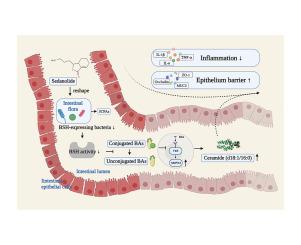当前位置:
X-MOL 学术
›
J. Adv. Res.
›
论文详情
Our official English website, www.x-mol.net, welcomes your feedback! (Note: you will need to create a separate account there.)
Sedanolide alleviates DSS-induced colitis by modulating the intestinal FXR-SMPD3 pathway in mice
Journal of Advanced Research ( IF 10.7 ) Pub Date : 2024-04-04 , DOI: 10.1016/j.jare.2024.03.026 Shengjie Li , Aoxiang Zhuge , Hui Chen , Shengyi Han , Jian Shen , Kaicen Wang , Jiafeng Xia , He Xia , Shiman Jiang , Youhe Wu , Lanjuan Li
Journal of Advanced Research ( IF 10.7 ) Pub Date : 2024-04-04 , DOI: 10.1016/j.jare.2024.03.026 Shengjie Li , Aoxiang Zhuge , Hui Chen , Shengyi Han , Jian Shen , Kaicen Wang , Jiafeng Xia , He Xia , Shiman Jiang , Youhe Wu , Lanjuan Li

|
Inflammatory bowel disease (IBD) is a global disease with limited therapy. It is reported that sedanolide exerts anti-oxidative and anti-inflammatory effects as a natural phthalide, but its effects on IBD remain unclear. In this study, we investigated the impacts of sedanolide on dextran sodium sulfate (DSS)-induced colitis in mice. The mice were administered sedanolide or vehicle followed by DSS administration, after which colitis symptoms, inflammation levels, and intestinal barrier function were evaluated. Transcriptome analysis, 16S rRNA sequencing, and targeted metabolomics analysis of bile acids and lipids were performed. Sedanolide protected mice from DSS-induced colitis, suppressed the inflammation, restored the weakened epithelial barrier, and modified the gut microbiota by decreasing bile salt hydrolase (BSH)-expressing bacteria. The downregulation of BSH activity by sedanolide increased the ratio of conjugated/unconjugated bile acids (BAs), thereby inhibiting the intestinal farnesoid X receptor (FXR) pathway. The roles of the FXR pathway and gut microbiota were verified using an intestinal FXR-specific agonist (fexaramine) and germ-free mice, respectively. Furthermore, we identified the key effector ceramide, which is regulated by sphingomyelin phosphodiesterase 3 (SMPD3). The protective effects of ceramide (d18:1/16:0) against inflammation and the gut barrier were demonstrated in vitro using the human cell line Caco-2. Sedanolide could reshape the intestinal flora and influence BA composition, thus inhibiting the FXR-SMPD3 pathway to stimulate the synthesis of ceramide, which ultimately alleviated DSS-induced colitis in mice. Overall, our research revealed the protective effects of sedanolide against DSS-induced colitis in mice, which indicated that sedanolide may be a clinical treatment for colitis. Additionally, the key lipid ceramide (d18:1/16:0) was shown to mediate the protective effects of sedanolide, providing new insight into the associations between colitis and lipid metabolites.
中文翻译:

Sedanolide 通过调节小鼠肠道 FXR-SMPD3 通路减轻 DSS 诱导的结肠炎
炎症性肠病(IBD)是一种治疗方法有限的全球性疾病。据报道,sedanolide 作为天然苯酞具有抗氧化和抗炎作用,但其对 IBD 的作用尚不清楚。在这项研究中,我们研究了景天内酯对右旋糖酐硫酸钠 (DSS) 诱导的小鼠结肠炎的影响。给小鼠施用景天内酯或媒介物,然后施用 DSS,然后评估结肠炎症状、炎症水平和肠道屏障功能。对胆汁酸和脂质进行了转录组分析、16S rRNA 测序以及靶向代谢组学分析。景天内酯可保护小鼠免受 DSS 诱导的结肠炎、抑制炎症、恢复脆弱的上皮屏障,并通过减少表达胆汁盐水解酶 (BSH) 的细菌来改变肠道微生物群。景天内酯下调 BSH 活性会增加结合/非结合胆汁酸 (BA) 的比例,从而抑制肠道法尼醇 X 受体 (FXR) 途径。分别使用肠道 FXR 特异性激动剂(fexaramine)和无菌小鼠验证了 FXR 通路和肠道微生物群的作用。此外,我们还确定了关键效应神经酰胺,它受鞘磷脂磷酸二酯酶 3 (SMPD3) 调节。使用人类细胞系 Caco-2 在体外证明了神经酰胺 (d18:1/16:0) 对炎症和肠道屏障的保护作用。景天内酯可以重塑肠道菌群并影响 BA 组成,从而抑制 FXR-SMPD3 通路刺激神经酰胺的合成,最终缓解 DSS 诱导的小鼠结肠炎。总体而言,我们的研究揭示了景天内酯对 DSS 诱导的小鼠结肠炎的保护作用,这表明景天内酯可能是结肠炎的临床治疗方法。此外,关键的脂质神经酰胺 (d18:1/16:0) 被证明可以介导景天内酯的保护作用,为结肠炎和脂质代谢物之间的关联提供了新的见解。
更新日期:2024-04-04
中文翻译:

Sedanolide 通过调节小鼠肠道 FXR-SMPD3 通路减轻 DSS 诱导的结肠炎
炎症性肠病(IBD)是一种治疗方法有限的全球性疾病。据报道,sedanolide 作为天然苯酞具有抗氧化和抗炎作用,但其对 IBD 的作用尚不清楚。在这项研究中,我们研究了景天内酯对右旋糖酐硫酸钠 (DSS) 诱导的小鼠结肠炎的影响。给小鼠施用景天内酯或媒介物,然后施用 DSS,然后评估结肠炎症状、炎症水平和肠道屏障功能。对胆汁酸和脂质进行了转录组分析、16S rRNA 测序以及靶向代谢组学分析。景天内酯可保护小鼠免受 DSS 诱导的结肠炎、抑制炎症、恢复脆弱的上皮屏障,并通过减少表达胆汁盐水解酶 (BSH) 的细菌来改变肠道微生物群。景天内酯下调 BSH 活性会增加结合/非结合胆汁酸 (BA) 的比例,从而抑制肠道法尼醇 X 受体 (FXR) 途径。分别使用肠道 FXR 特异性激动剂(fexaramine)和无菌小鼠验证了 FXR 通路和肠道微生物群的作用。此外,我们还确定了关键效应神经酰胺,它受鞘磷脂磷酸二酯酶 3 (SMPD3) 调节。使用人类细胞系 Caco-2 在体外证明了神经酰胺 (d18:1/16:0) 对炎症和肠道屏障的保护作用。景天内酯可以重塑肠道菌群并影响 BA 组成,从而抑制 FXR-SMPD3 通路刺激神经酰胺的合成,最终缓解 DSS 诱导的小鼠结肠炎。总体而言,我们的研究揭示了景天内酯对 DSS 诱导的小鼠结肠炎的保护作用,这表明景天内酯可能是结肠炎的临床治疗方法。此外,关键的脂质神经酰胺 (d18:1/16:0) 被证明可以介导景天内酯的保护作用,为结肠炎和脂质代谢物之间的关联提供了新的见解。



























 京公网安备 11010802027423号
京公网安备 11010802027423号